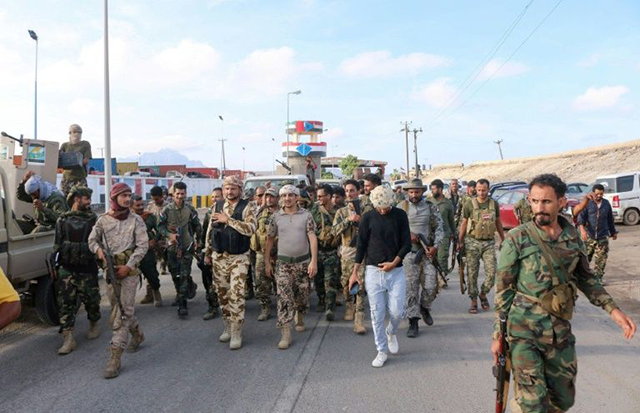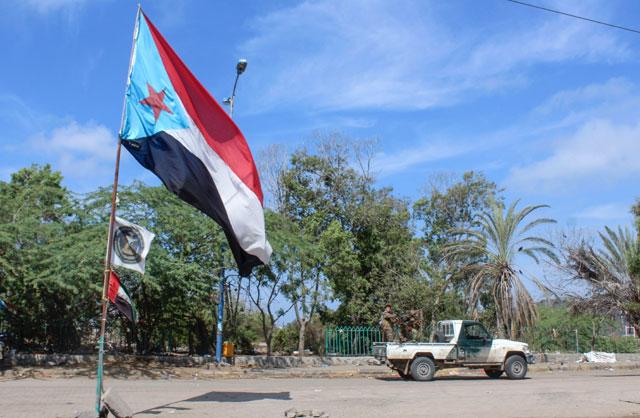You are here
Saudi-led coalition rejects south Yemen self-rule declaration
By AFP - Apr 27,2020 - Last updated at Apr 27,2020

Fighters with Yemen's Southern Transitional Council drive past a separatist flag -- the flag of the former nation of South Yemen -- in the city of Aden (AFP photo)
RIYADH — The Saudi-led military coalition in war-torn Yemen on Monday rejected a declaration of self-rule by separatists in the country's south and demanded "an end to any escalatory actions".
The breakaway declaration made Sunday threatens to reignite a "war within a war" in the Arabian Peninsula's poorest country, which is already gripped by what the United Nations calls the world's worst humanitarian disaster.
The secessionists' move significantly complicates the country's five-year-old wider conflict, fought by the Saudi-led coalition and Yemen's internationally recognised government against Iran-backed H0uthi rebels who control much of the north including the capital Sanaa.
Separatists in the south, which used to be an independent country, have repeatedly agitated to break away again -- a campaign that was temporarily put to rest with a power-sharing, coalition-sponsored deal signed in Riyadh last November.
But on Sunday the Southern Transitional Council (STC) declared self-rule in southern Yemen, accusing the government of failing to perform its duties and of "conspiring" against the separatists' cause.
UN Special Envoy for Yemen Martin Griffiths said on Monday he was concerned by the recent declaration, calling for expediting the implementation of the Riyadh deal.
"The Riyadh Agreement provides for the participation of the STC in consultations on the final political solution to end the conflict in Yemen and serving the interests of Yemenis nation-wide," he said in a statement.
Residents of the southern city of Aden, the government's temporary capital, reported heavy deployments of STC forces.
A separatist source told AFP they had set up checkpoints "at all government facilities, including the central bank and port of Aden".
The Yemeni government condemned the move and warned it could lead to a "catastrophic and dangerous" outcome.
The coalition said, according to Saudi Press Agency tweets, that "we re-emphasise the need to promptly implement the Riyadh Agreement".
"The coalition demands an end to any escalatory actions and calls for return to the agreement by the participating parties."
Virus, floods, cholera
Key coalition partner the United Arab Emirates, which has supported the STC, also stressed the importance of abiding by the Riyadh pact.
"Frustration over delay in implementing the agreement is not a reason to unilaterally change the situation," UAE's Minister of State for Foreign Affairs Anwar Gargash tweeted.
"We have full confidence in Saudi Arabia's keenness to implement the agreement."
The breakdown between the one-time allies comes as the coalition has extended a unilateral ceasefire that it says is aimed at fending off the coronavirus pandemic -- an olive branch that has been rejected by the Houthis.
Compounding the country's troubles, at least 21 people have been killed in flash floods this month, which left Aden's streets submerged and homes destroyed.
The STC self-rule move was "an opportune moment" owing to various circumstances, Elizabeth Kendall of Oxford University said.
"International attention is focused on the Saudi-announced ceasefire with the Huthis and the alarming threat of COVID-19, and regional actors are distracted by the start of Ramadan," the Muslim fasting month, Kendall told AFP.
"Add to this the heightened tension after recent massive flooding caused widespread devastation, setting off a political point scoring match between the government and the STC, both of whom hailed the poor response as evidence of the other parties inability to govern."
According to the UN, more than 100,000 people across Yemen have been affected by the torrential rains which damaged roads, bridges and the electricity grid and contaminated water supplies.
"Countless families have lost everything," Lise Grande, the UN's Humanitarian Coordinator for Yemen, said in statement on Sunday.
'Jeopardising stability'
The Riyadh pact on power-sharing for the south had been hailed as averting the complete break-up of the country, but with a lack of implementation, observers have said it is effectively defunct.
Cracks emerged soon after it was signed, with complaints over food shortages in the south, a sharp depreciation of the currency and a lack of funds to pay public sector employees.
Saudi State Minister of Foreign Affairs Adel Al Jubeir said in a tweet that "we in [Saudi Arabia] and UAE strongly believe that the internationally backed Riyadh agreement has guaranteed an opportunity for the brotherly Yemeni people to live in peace".
"We reject any hostilities that will jeopardise the safety and stability of Yemen."
Calling the latest turn of events "disappointing", UN envoy Griffiths urged all sides to cooperate "in good faith" and "put the interests of Yemenis first".
While the government and the STC have been technically allies in the long war against the Houthis, the secessionists believe the south should be an independent state -- as it was before unification in 1990.
Related Articles
ADEN — Yemeni separatists early Sunday declared self-rule of the country's south as a peace deal with the government crumbled, complicating
ADEN — Fighting broke out on Monday between government troops and separatists in southern Yemen, officials said, in the first major clash si
DUBAI — Yemen's southern separatists said on Wednesday they had withdrawn from talks over a Saudi-sponsored power-sharing deal with the inte














